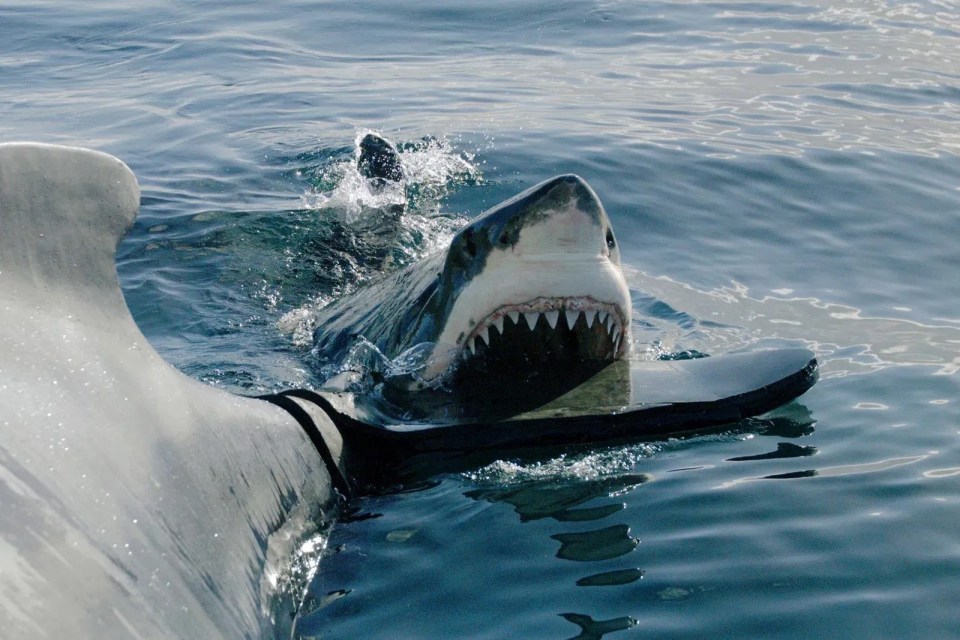THIS is the eerie moment a large ocean predator was lured into a research trap by the scent of blood.
Footage shows researchers pumping 200 gallons of fake blood to attract a great white shark.
Discovery/CNN Newsource/WKRCA female shark turned up and began displaying aggressive behaviour[/caption]
Discovery/CNN Newsource/WKRCFake blood spewed from a fake whale carcass[/caption]
Discovery/CNN Newsource/WKRCThe 200 gallons of blood caused a feeding frenzy among the sharks[/caption]
The research scientists from New Zealand hid inside a realistic looking whale carcass to test the “queen boss theory”.
The “queen boss theory” is based on the idea that clans of sharks are created around female sharks that reproduce with multiple mates at once.
In the eerie footage, several male sharks were the first to arrive at the scene.
On researcher could be heard saying: “We’ve ignited a feeding frenzy.”
One notable male shark, measuring 13 feet in length, displayed numerous marks, indicating his readiness to impress the queen.
A 14ft female shark, thought to be the ‘queen’ also arrived on the scene.
While researchers said she wasn’t quite in the size class of a ‘queen boss’, the 14ft female shark exhibited aggressive behaviour.
Researchers could be heard saying: “She’s munching on the tail.
“Look at her teeth.”
The experiment helps shed light on the behaviour of great white sharks and their aggressive hunting tactics and social structures.
The great white shark isn’t the only apex predator that scientists are interested in.
Researchers believe the invincible Greenland Shark’s metabolism could hold the secret to its long life – and they’re hoping it will do the same for us.
The monsters, who grow to 23ft, have been known to eat polar bears.
Sightings are known to be rare as many do live 600 metres under Arctic ice.
Now experimental research shows that muscle metabolic activity may be an important factor in the incredible longevity of the Greenland shark.
The new findings could be key to improving heart health and help other species against climate change.
They hope to learn what determines life expectancy in different species including humans.
Meanwhile, sharks have been making headlines across the shores.
A man was mauled by a shark in Australia just hours after locals were warned about possible attacks.
Emergency responders raced to the beach on the northwest coast this morning and the man was rushed to hospital.
He was attacked on Fourteen Mile Beach, near Coral Bay in Western Australia, by an unknown species of shark.
Only 10 minutes before the beast pounced, a shark thought to be 13 feet long was spotted off the coast of Exmouth – about 200km away.
A local official has since confirmed the man is in stable condition.
In America, a shark struck four times in the resort town of South Padre Island, Texas.
The one-minute-long video shows the woman lying on the sand while the predator swims back and forth near the shoreline.
Rescuers rush to her aid, as they try and stem the bleeding from a wound on her leg.
Blood can be seen in the waves as the victim appears to be in shock following the attack.
The woman is thought to have suffered serious injuries and was rushed to hospital.
Tabatha Sullivent one one of the four shark victims and revealed that she had lost her left calf.
Sullivent recalled the moments leading up to being savaged and said she thought the shark was initially a big fish.
She was bitten after frantically trying to kick away.
“And at that point, that’s when it bit me,” she told the NBC affiliate KXAS-TV.
“And had I not pulled my legs up, it probably would’ve got my torso or something else.”
New Smyrna Beach has been dubbed the shark bite capital of the world.
Experts have warned beachgoers should avoid wearing shiny jewelry because sharks could think humans are fish.
Swimmers should also avoid heading into the water at sunrise and dusk.
What is the ‘Queen Boss Theory’
The theory suggests that genetically distinct clans of great white sharks form around one reproductive superstar female.
The queen boss shark is a large mature female shark that dominates a social group of smaller sharks.
By observing the interactions between male and female sharks, scientists aim to gain a deeper understanding of how shark clans are formed and maintained.
The experiment opens up new avenues for future research, including further studies on shark social structures and reproductive behaviours.
Discovery/CNN Newsource/WKRCThe queen boss theory suggests that clans of sharks form around one reproductive superstar female shark[/caption]
Discovery/CNN Newsource/WKRCResearch scientists released 200 gallons of fake blood to test the queen boss theory[/caption]
Discovery/CNN Newsource/WKRCThe fake blood attracted several sharks[/caption]

